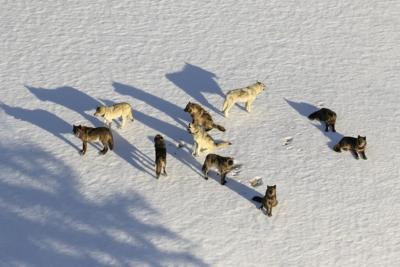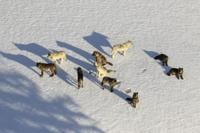BILLINGS, Mont. (AP) — A Montana judge has temporarily restricted wolf hunting and trapping near Yellowstone and Glacier national parks and imposed tighter statewide limits on killing the predators, over concerns that looser hunting rules adopted last year in the Republican-controlled state could harm their population.
State officials authorized the killing of 450 wolves during the winter of 2021-22, but ended up shutting down hunting near Yellowstone ������ϲʹ������� Park after , most of them in Montana.
Conservation groups last month sued over 2021 laws passed by the Legislature that were intended to curb gray wolf numbers by . The laws allowed the use of snares, which some consider inhumane, and led to rules that allow individuals to kill up to 20 wolves each — 10 from hunting and 10 from trapping.
Attorneys for WildEarth Guardians and Project Coyote argued that rules in place for this winter would hurt wolf populations and interfere with management of the animals on federal lands such as Yellowstone, where hunting is not allowed.
State District Court Judge Christopher Abbott on Tuesday ordered Montana Fish Wildlife and Parks to return to a limit of five wolves killed per person. He also blocked the use of snares when trapping season begins on Nov. 28, and reimposed sharp limits on hunting and trapping near the national parks.
The order is due to expire Nov. 29, but Abbott set a hearing on the matter for Nov. 28 in Lewis and Clark County.
“This is a promising step in the right direction, and we will continue using all means necessary to end the senseless, politically motivated slaughter of Montana’s beloved wolves,” said Lizzy Pennock, of WildEarth Guardians.
Montana wildlife officials said the changes ordered by Abbott would take effect immediately.
Montana Fish, Wildlife and Parks Director Hank Worsech said in a statement that the state has “proven we can manage wolves.”
“We will comply with the judge’s order and look forward to the opportunity to defend good science and management strategies,” he said.
Gov. Greg Gianforte criticized the ruling in a social media post, saying the judge “overstepped his bounds to align with extreme activists.”
Gianforte trapped and last year on private land near the park. He was later given a warning for violating state hunting rules by killing the wolf without first taking a mandatory trapper education course.
A total of 273 wolves were reported killed in Montana last winter, out of population of about 1,100 wolves. This year, the state authorized the killing of up to 456, including six north of Yellowstone park. Abbott's order reduces that to two wolves outside the park.
As of Wednesday, hunters had killed 56 wolves since the season opened in September.
The judge said he wanted to prevent an “acceleration” of wolf kills as trapping season opens. But he rejected a request by the conservation groups to halt all wolf hunting and trapping.
“At least some hunting activity can proceed without severe impacts on wolf populations at least long enough to afford the state an opportunity to be heard,” Abbott wrote.
Wolves were exterminated in most of the U.S. by the 1930s under government-sponsored poisoning and trapping campaigns. They were reintroduced from Canada into the northern U.S. Rockies in the 1990s and have rebounded in areas of the Great Lakes.
Wilderness areas in Idaho, Montana and Wyoming have become strongholds for wolf populations and wolves were taken off the federal endangered species list in the region in 2011. That’s helped fuel the species’ expansion in recent years into parts of Oregon, Washington state and California.
Montana and Idaho loosened their their wolf hunting rules at the urging of hunters and ranchers who wanted fewer wolves on the landscape.
Advocates last year petitioned the U.S. Fish and Wildlife Service to restore endangered protections for wolves in the Western U.S. The Biden administration said in a preliminary finding last September that protections for wolves because new laws in Idaho and Montana posed a potential threat to wolves across the region.








































